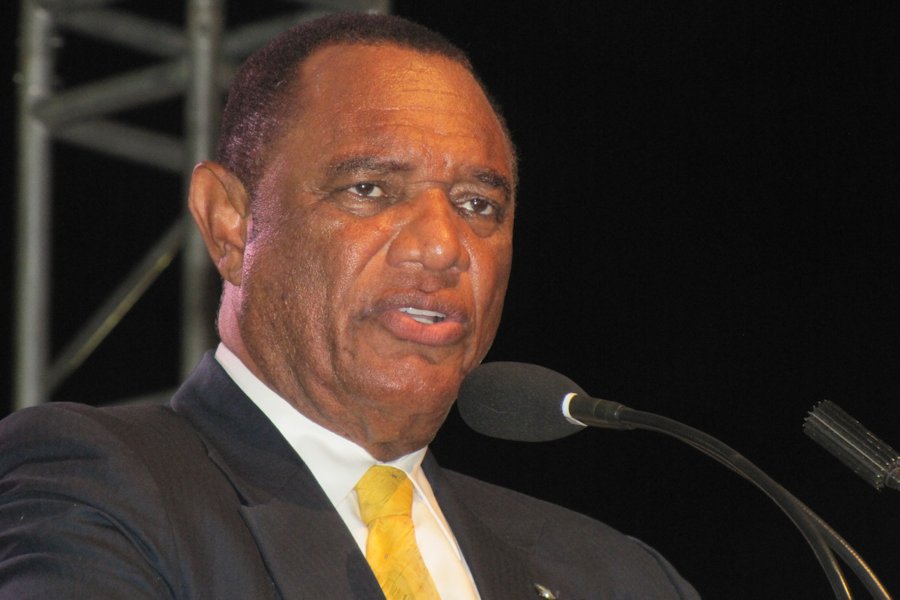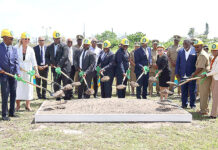
Nassau, Bahamas – Communication by the Rt. Hon. Perry G. Christie Prime Minister and Member Of Parliament For Centreville The Hawksbill Creek(grand Bahama Deepwater Harbour And Industrial Area) Act Dated 3rd February, 2016:
Mr. Speaker,
On July 22, 2015 I made a communication to Parliament concerning the Review of certain concessions contained in the Hawksbill Creek Grand Bahama (Deep Water Harbour and Industrial Area) (Extension of Tax Exemption period) Act 1993, which had been extended for a period of 22 years and were set to expire on August 4, 2015. In order to provide further time for the review and negotiation process, the concessions were extended for a period of 6 months which expires on February 4, 2016, with the enactment of the Hawksbill Creek Grand Bahama (Deep Water Harbour and Industrial Area) (Extension of Tax Exemption Period) Amendment Act 2015.
The tax concessions include the following:
i. Firstly, no real property tax or real property levy;
ii. Secondly, no personal property tax and no capital levies or taxes on capital gains or capital appreciation; and
iii. Thirdly, no taxes of any kind on the earnings of the Port Authority or the earnings of its licensees.
Mr. Speaker,
It is important that I should put into historical context that it was intended in the original Hawksbill Creek Agreement (HCA) in 1955 that these particular concessions would last for a period of 30 years. By an amendment to the HCA in 1960, these concessions were extended for a further five (5) years, thus expiring in 1990. By Act No. 4 of 1992 (which was retroactive to August 1990), the concessions which expired in 1990 were extended for a further three (3) years, thus expiring in 1993. By the Hawksbill Creek Grand Bahama (Deep Water Harbour and Industrial Area) (Extension of Tax Exemption Period) Act 1993, these concessions were extended for a further 22 years.
I should point out that when the last extension was done by the previous administration in 1992, the concessions had expired in 1990, which necessitated retroactive legislation being passed. It took two years to complete the process whereas under my administration the process will be completed in less than a year from the August 2015 expiry date.
Clearly it was not intended in the original HCA that these concessions would last beyond 30 years. The Grand Bahama Port Authority Limited (GBPA) and by extension, its licensees, received the benefits and land grants for carrying out the development and other relevant obligations set out in the HCA.
Mr. Speaker,
It is against this background that I should draw attention to the following excerpts of my July 22, 2015 Communication and I quote:
“ The imminent expiration of these concessions under the Hawksbill Creek Agreement has provided an opportunity for the Government to secure a comprehensive set of new arrangements aimed at spurring economic development in Grand Bahama while at the same time increasing Grand Bahama’s contribution to net fiscal receipts on a fairer and more equitable basis having regard to the interests of The Bahamas as a whole.
“ Accordingly, and with that aim in mind, the Government retained international consultants to undertake a study of the economic situation within the Port Area; the implications of renewing expiring incentives of the kind in question; and the adoption of new measures aimed at accelerating, broadening and sustaining economic development in Freeport and Grand Bahama generally; and to consult with the Grand Bahama Port Authority and other stakeholders,
“ Additionally, the Government appointed a Committee to review and make recommendations with respect to the impending expiration of the tax concessions in question under the Hawksbill Creek Agreement, and to recommend other measures that might be taken to promote and sustain economic growth in Grand Bahama.
“ The tax concessions in question are of great importance to the further economic development of the City of Freeport, and the entire Island of Grand Bahama.
“ Due to the in-depth and comprehensive nature of the study and the report of the Committee, which would also require further consultation and negotiations with stakeholders and the Grand Bahama community, more time is clearly needed to complete this vital exercise.
“ In the meantime, however, to emphasize the thoroughness of the review that was carried out, the Committee met with over 100 stakeholders, including civil society, manufacturers, developers, tourism operators, professionals, and present and former Parliamentarians drawn from both sides of the parliamentary divide. In addition, the Committee hosted public meetings with the community.
“ Clearly, there is still a great deal for the Government to digest and consider before settling the longer way forward based on the study by the consultants and, more especially, the report from the Committee.”
Mr. Speaker,
The high level bi-partisan Review Committee comprising outstanding citizens and residents assisted by able consultants and a technical team as well as an efficient Secretariat took seriously its mandate to consult with and listen to stakeholders, especially licensees. They received outstanding contributions from licensees and other stakeholders.
The Hawksbill Creek Agreement Review Committee’s extensive and far reaching recommendations to the Government include extension of the expiring tax concessions for a period of 20 years in exchange for the following with a mechanism to monitor performance through periodic review every five (5) years, with a view to ensuring the best economic outcome for all parties:
1. Within one (1) year of extension, secure an international investor with the capacity to purchase majority ownership of GBPA to enable it to properly meet its obligations and development commitments;
2. Submission by the Grand Bahama Development Company Ltd of a specific master development plan within six months of the extension, focused on the key sector opportunities above and including detailed development plans and concrete evidence of financing;
3. Change to the governance structure to allow for the Government to participate in GBPA and PGL through Directors/members appointed to the Board with a clear role and responsibility around development. Further, licensees to be able to elect a Director to the GBPA Board;
4. An equity interest for the Government in GBPA and PGL companies in consideration for the value of the concession extensions, the value of any unmet obligations under prior extensions, as well as any obligations of the GBPA not met under the HCA (e.g. any deficit in the Port Area, any unmet maintenance and operations responsibilities), following an independent audit by an accounting firm to be mutually agreed;
5. GBPA / PGL must establish and capitalize an independent investment promotion agency (IPA), with expertise in retaining, expanding and attracting businesses;
6. To introduce a process which gives the right of appeal for GBPA’s licensing decisions;
7. Reaching mutually agreeable terms relating to the exclusive rights of Freeport Harbour Company to container ports, cruise ports, etc. on Grand Bahama, which would allow for exclusive right on container ports for a fixed period, and the development and operation of cruise ports within and outside the port area by other parties;
8. Agreement to modernize the Grand Bahama International Airport and pursue options to lower cost of airlift (e.g., under a public/private partnership arrangement);
9. Specific commitments around quality of life investments (e.g., hospital, sports centre upgrades, bridge/road upgrades, etc.);
10. Transparency by providing to the public information on revenue and expenses for municipal services;
11. Work in collaboration with the Bahamas Government and the Grand Bahama Port Authority to secure suitable partners and arrangements which would secure the economic viability of Hutchison’s hotels, casino and tourism assets, and curtail unsustainable losses and large Government subsidies.
12. The possible introduction of real property tax on undeveloped land as a stimulus for development and the provision of the necessary revenue, to meet the rising cost of government services and infrastructure costs in Freeport, or some alternative form of contribution from the GBPA and its licensees to meet such costs.
In parallel to recommending changes to the current ownership and governance on the island, the Committee also recommends that certain other changes be made to increase the competitiveness of Grand Bahama as a location for global investment. Those changes are as follows:
1. Create a one-stop-shop to manage all GBPA and governmental approvals, with specific guidelines, and, where matters need to be referred to the Central Government, a period of no more than twenty-one (21) days be fixed for approval/determination (as the case may be);
2. Move certain regulation currently overseen by GBPA to independent public bodies (e.g., energy regulation to a public regulator, environment to the Ministry responsible, airport fees and charges to the Ministries/Agencies responsible.);
3. Create transparency and fiscal stability for Grand Bahama Island by conducting one-time and on-going audits of Government deficit on GBI, performed by a mutually agreed public accounting firm. Moving forward, the Government should present such accounting to GBPA annually to determine whether a deficit exists;
4. Improve efficiency of dealing with labour and immigration matters. The Ministries responsible for immigration and labour should establish a system to efficiently deal with work permits on an expedited basis, (within 21 days), and, where earlier approvals are needed, within 48 hours, recognizing that there may exist a need for specialist skills which are not readily available in The Bahamas;
5. Improve skills training and recruitment. Establish an ongoing multifaceted training programme suited to the skills needed in Grand Bahama, involving Ministries responsible for Education, Training and Labour, the College of the Bahamas, the National Training Agency, principal licensees, the GB Chamber of Commerce, and the GBPA;
6. Improve data collection on Gross Domestic Product (GDP) such that progress is able to be tracked;
7. Improve communications between Government and GBPA, licensees and public prior to any major policy changes;
8. To the extent that it has not done so, GBPA and Dev Co. to ensure that land transactions (historical and moving forward) are duly recorded at the Registrar General’s Department.
Mr. Speaker,
Having listened carefully and received visionary recommendations, it is clear that further work needs to be done to enable the design of a strategic plan and its implementation. The Government will also need further time for consultation with relevant stakeholders as to whether it should acquire an equity interest in the GBPA.
It has transpired that these far reaching recommendations of the Review Committee have necessitated the requirement for gathering of additional information by the Committee from the GBPA and certain licensees to support the consultation, negotiations and decision making process by the Cabinet. This has proven to be more time consuming than originally contemplated as required information has not always been readily forthcoming. It has become necessary, in addition, to the McKinsey Report, a copy of which I lay on the table of Parliament, for the Review Committee to commission an economic impact study which has just recently been completed.
The results are awaited of an accounting exercise which will better inform the Government on revenues and expenditures in the Port Area over the last several years, and a report on undeveloped land holdings of licensees within the Port Area, are being prepared by two Bahamian professional firms.
Meanwhile, in order to fully inform the public on the review process and the extent of its work, the Review Committee has launched a website (www.hcareview.org) which is now available to all.
While the Review Committee gathers and analyses further information, a Committee of Cabinet led by myself is engaged in discussions and negotiations with GBPA and with stakeholders on pertinent issues and recommendations.
Mr. Speaker,
It is the clear intention of the Government not to place those existing stakeholders in Freeport with major investments that are contributing significantly to the economy of Grand Bahama and will continue to do so, at a tax disadvantage. On the other hand, we face the reality that significant new development is not taking place in Freeport in the same manner as other Islands in The Bahamas that have neither the tax nor infrastructural advantage of Freeport. Unemployment is also higher in Freeport and Grand Bahama than in these other islands. We must therefore question why these conditions exist and set about to address them.
The visionaries and driving forces of the GBPA, the late Sir Jack Hayward, the late Edward St. George and the late Sir Albert Miller, are no longer with us. The Hayward and St. George families of shareholders have until recently been mired in dispute.
The Hawksbill Creek Review Committee and the world renowned McKinsey Group of advisors, along with the local community and international business interests, strongly believe that Freeport needs new investors with capital and expertise to execute a vision that will lead to growth and prosperity for Grand Bahama.
Mr. Speaker,
It is now sixty years since the HCA and its enabling legislation came into being. The world and The Bahamas have changed a lot since then, and so have competition and international best practices. No longer can an entity like GBPA be licensor and licensee, regulator and investor with no rights of appeal by licensees, without inherent conflicts and dissatisfaction. What may have served Grand Bahama well in the past, no longer obtains.
To bring long-term certainty and confidence among investors and the public, the Government although not interested in management, must have a seat at the table of the GBPA, and put measures in place that would not allow internal shareholder fights. Those measures would also expedite decision making, create a dynamic, professional world class promotional entity and ensure an overall environment that keeps Grand Bahama on the cutting edge of competition and ensure compliance with world class best business practices.
Mr. Speaker,
I believe that we can collectively between Government and the private sector make Grand Bahama soar again to new heights of economic and social development. We shall be judged by this generation, the next generation of Bahamians, and all persons of goodwill by what we shall do in respect of these expiring concessions in Freeport and related relevant issues for the next 20 years.
In order for the Hawksbill Creek Agreement Review Committee and the Government to adequately and successfully address all of the foregoing issues more time is needed. In the circumstances I shall be seeking a further extension of three months to maintain the status quo on the expiring tax concessions under the Hawksbill Creek Grand Bahama (Deep Water Harbour and Industrial Area) (Extension of Tax Exemption period) Act 2015.









